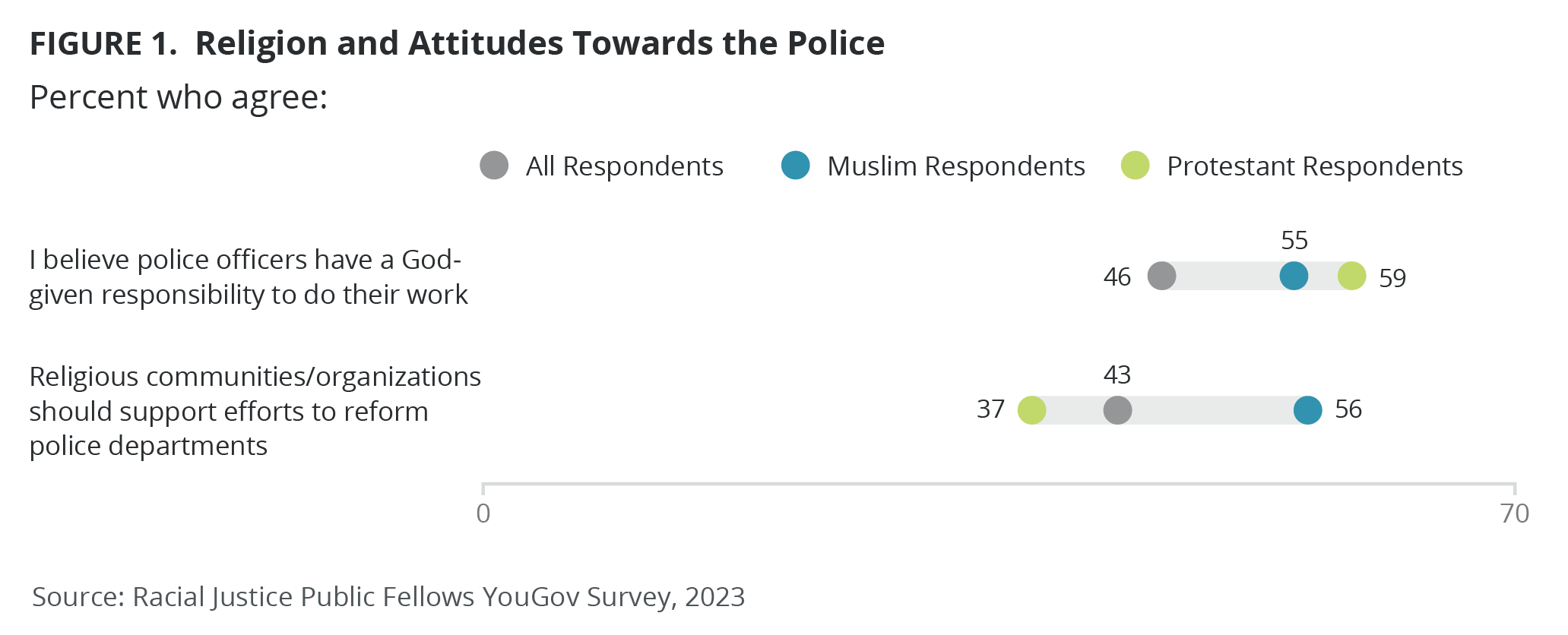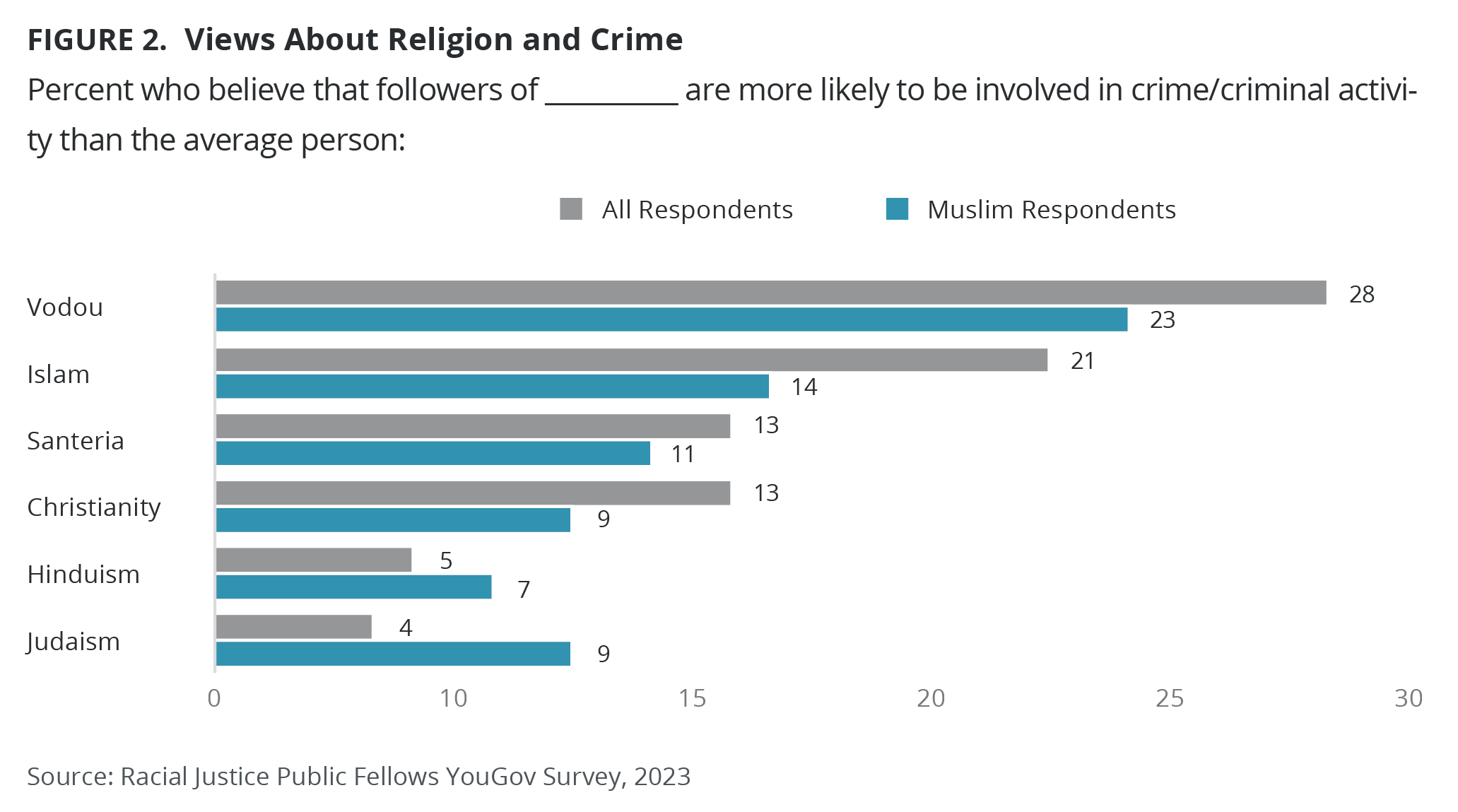As the members of the 2022-2023 PRRI Public Fellows cohort focused on racial justice and White Supremacy, our group conducted a survey to explore American perceptions concerning race, religion, and public safety. In August 2023, we surveyed a nonprobability sample of 1,000 Americans with an oversample of 300 American Muslims, an understudied population in scholarship on race and public safety. We used the YouGov survey platform, which employed a matching and weighting strategy to a sampling frame representative of the U.S. population.[1] The results yielded important data on American and Muslim attitudes toward policing and supported previous findings about ongoing discrimination against Muslims in the United States. It also provided new insights into public perceptions of African diaspora religions, which are rarely included in public opinion surveys.
Muslim Respondents’ Attitudes on Public Safety
In our survey, we asked about American Muslims’ general perceptions of crime, public safety, and policing, as well as whether mosques in their communities have been threatened. We also examine whether there are differences in attitudes held among Muslims corresponding to racial identity. Research on Muslims in the United States has centered on their experiences with surveillance and public national security concerns (e.g., “flying while Muslim”), governmental registration of Muslim noncitizens, and the ways in which Muslims encounter discrimination and threats in their everyday lives.
Our survey results show that Muslim respondents (19%) are more than twice as likely as all respondents (8%) to have been threatened with violence in their place of worship.[2] Similarly, 16% of Muslim respondents report vandalism at their place of worship, compared with 12% of all respondents. Muslims (27%, including 12% who strongly feel unsafe) are also more likely than all respondents (18%, including 6% who strongly feel unsafe) to report feeling unsafe in their place of worship due to threats of violence. Further, Muslim respondents (39%) are more likely to report that their place of worship has hired private security, compared with all respondents (23%).[3]
When asked if crime is an issue in their community, 24% of Muslim respondents say it is a major problem compared with 15% of all respondents. Broken down by race among Muslim respondents, 20% of white Muslim respondents say crime is a major problem, while 36% of Black Muslim respondents say the same. This may reflect the impact of residential racial segregation on crime rates and over policing. When asked about the relationship between the police and place of worship, 26% of Muslim respondents say it is very good compared with 34% of all respondents. When asked if they trust police officers, 20% of Muslim respondents strongly agreed compared with 28% of all respondents. The higher number of Muslims who do not trust the police may be due to the hyper-surveillance of Muslims or reflect African American Muslims’ experiences with policing.
Some of the most interesting findings in the survey are the attitudes discovered about police reform. Nearly one in four (23%) survey respondents say police departments are doing fine as-is, while 38% say police departments should undergo minor reforms, another 34% say they should undergo major reforms, and 5% say police departments should be abolished completely. Muslim respondents show similar attitudes, including 22%, 39%, 35%, and 4%, respectively.
There were some differences between Protestant and Roman Catholic respondents’ attitudes on police reform, with 32% percent of Protestant respondents saying that the police are doing fine as-is compared with 25% of Catholic respondents.
Results were also broken down by race, showing 35% of white Protestant respondents feel that the police are doing fine as-is, 45% feel they need minor reform, 19% feel they need major reforms, and 1% feel they should be abolished completely. Thirty percent of white Roman Catholic respondents feel police departments are doing fine as-is, 42% responded they need minor reforms, 28% feel they needed major reforms, and none said that they should be abolished. For white Muslim respondents, 28% feel the police are doing fine as is, 51% feel they need minor reforms, 21% feel they need major reform, and none feel they should be abolished. Among nonwhite Muslims, 16% feel the police are doing fine as is, 31% feel they need minor reforms, 46% feel they need major reform, and 7% feel they should be abolished, reflecting that it is nonwhite Muslim survey respondents who favor abolishing the police. As with perceptions of crime, these findings are important as they reflect that attitudes toward policing for religious groups are complicated by their racial and ethnic identities.
Another interesting finding from our survey has to do with American Muslims’ religious understandings of the role of police and of police-related activism. When asked whether police officers have a God-given responsibility, Muslim respondents have a slightly higher positive response than all respondents (55% vs. 46% agreeing, respectively). At the same time, Muslim respondents are more likely to see police reform efforts as an obligation of religious communities, with 56% supporting such work, compared with 43% of all respondents. This is also much higher than the 37% of Protestant respondents who see working for police reform as a religious obligation (despite Protestants having similar rates of seeing police as having a God-given responsibility, at 59%). Religious convictions matter for American Muslims in their views of law enforcement; this conviction seems to lead to both a high degree of respect for the work of police at the same time that it leads to more support for reform.

Public Opinions on Religion and Crime
To explore the relationship between religious communities’ attitudes on policing and public perceptions of the relationship between religious affiliation and criminal activity, the survey included questions asking whether association with a particular religion made a person more prone to crime and extremism. One of these questions included the statement: “I believe that followers of _____ are more likely to be involved in crime/criminal activity than the average person.” Participants were asked to “select all that apply” from an answer bank comprised of six religions: Christianity, Islam, Judaism, Hinduism, Santeria, Vodou/Voodoo. They also had the option to pick “None of the Above.”
About one-fifth (21%) of all survey respondents indicated that they believed that followers of Islam were more likely to be involved in crime/criminal activity than the average person. By contrast, only 13% selected followers of Christianity, a mere 5% selected followers of Hinduism, and 4% selected followers of Judaism. These responses potentially point to ongoing public skepticism and discrimination that Muslims face in the United States, even as Muslims have grown in representation on the national stage and in the population at large.
It is interesting to note, however, that Muslim respondents expressed somewhat analogous views, with14% of Muslim respondents indicating that Muslims were more likely to be involved in crime/criminal activity than the average person. In comparison, 9% of Muslim respondents selected Judaism, 9% selected Christianity, and 7% selected Hinduism.
Perhaps most striking was the response regarding followers of Vodou/Voodoo perceived involvement in criminal activity, which was selected by 28% of all respondents and 23% of Muslim respondents. This is likely the first time that African diaspora religions like Vodou (more commonly known by the pejorative “Voodoo”) have been included in such a survey. This data suggests that devotees of Vodou are regarded as more prone to criminal behavior than followers of more mainstream religions such as Christianity, Islam, and Judaism.

Our survey results point to the ongoing need for consideration of religious perceptions and perspectives (particularly those of religious minorities) as a part of the broader public reckoning on issues of race, crime, and policing in the United States.
[1] YouGov interviewed 1,109 respondents who were matched down to a sample of 1,000. The sampling frame is a politically representative “modeled frame” of U.S. adults, based upon the American Community Survey (ACS) public use microdata file, public voter file records, the 2020 Current Population Survey (CPS) Voting and Registration supplements, the 2020 National Election Pool (NEP) exit poll, and the 2020 CES surveys, including demographics and 2020 presidential vote. The matched cases were weighted to the sampling frame using propensity scores, producing the final genpop weight. In addition, YouGov interviewed 329 respondents who were matched down to a sample of 300. The frame was constructed by stratified sampling from the 2017 survey of U.S. Muslims sample with selection within strata by weighted sampling with replacements (using the person weights on the public use file). The propensity score function included age, gender, race/ethnicity, and education, and the weights were then post-stratified on 2020 Presidential vote choice, gender, age, race, and education, to produce the final Muslim weight.
[2] Throughout this Spotlight, when we refer to all respondents, we present weighted percentages excluding the Muslim oversample. When we discuss Muslim respondents, we show weighted percentages related to the Muslim oversample.
[3] Forty percent of Muslim respondents identified as white, 20% as Black, 20% as Asian, 8% as Middle Eastern, 8% as Hispanic, 1% as indigenous, 1% as multiracial, and 3% self-identified as “other.”
Aaron Griffith, Th.D., Danielle Boaz,Ph.D., and Saher Selod, Ph.D. were members of the 2022-2023 PRRI Public Fellows Cohort.